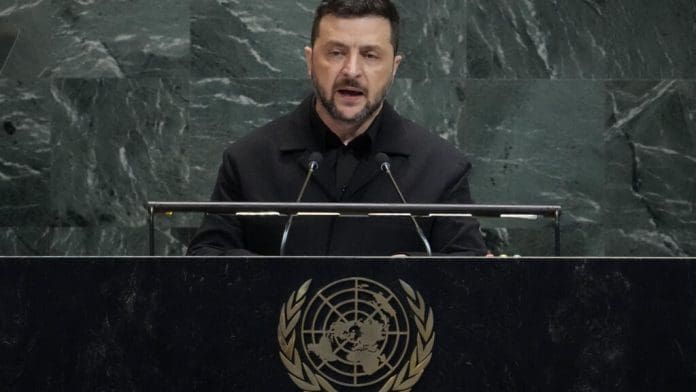Ukrainian President Volodymyr Zelensky delivered a scathing critique of the United Nations on September 24, 2025, describing international institutions as “too weak” to prevent warfare during his address to the 80th UN General Assembly, as his country continues defending against Russian invasion after three-and-a-half years of conflict.
Speaking at the General Assembly, Zelensky warned that the prestigious podium serves only for speeches rather than meaningful intervention. “Nations can speak about their pain from stages like this, but even during bloodshed, there isn’t a single international institution that can truly stop it,” the Ukrainian leader declared. “That’s how weak these institutions have become.”
The Ukrainian president argued that international organizations have failed to maintain peace and security, stating that “because international institutions are too weak, this madness continues… Weapons decide who survives.” He warned of the most destructive arms race in human history, emphasizing that military force now determines global interactions rather than diplomatic mechanisms.
Zelensky’s criticism targets fundamental UN Security Council structures where Russia holds veto power, consistently blocking binding resolutions that could impose sanctions or authorize military action against Moscow. The Ukrainian leader’s frustration reflects ongoing challenges in securing international enforcement mechanisms against Russian aggression.
During his address, Zelensky characterized Russian attacks as “clearly a genocide” and called on member nations to explicitly condemn Russia’s actions. He emphasized that “any parallel or alternative attempts to seek peace are, in fact, efforts to achieve a lull instead of an end to the war,” urging nations to maintain pressure on Moscow.
The speech followed a significant diplomatic development. On Tuesday, US President Donald Trump posted on Truth Social following their meeting that Ukraine “with the support of the European Union, is in a position to fight and WIN all of Ukraine back in its original form,” marking a notable shift from his previous positions suggesting territorial concessions for peace.
Trump’s statement represents a dramatic change from earlier calls on Kyiv to make concessions to end the war. The American president’s evolved position provides crucial political backing for Ukraine’s territorial integrity claims, potentially influencing international support dynamics.
In his own UN address, President Trump indicated possibilities for increased economic pressure on Russia while conditioning US action on European commitment to join such measures. This approach faces significant bureaucratic and political challenges across European capitals, where unity on sanctions implementation remains complex.
Zelensky also addressed regional security concerns, warning that “Georgia is already being lost and becoming dependent on Russia, and so is Belarus,” while emphasizing that “Europe cannot afford to lose Moldova, too.” He stressed that Moldova requires funding and energy support beyond political gestures.
The Ukrainian leader’s UN appearance occurs amid ongoing international efforts to address the conflict’s broader implications. Unlike President Trump’s dismissive tone earlier this week, Zelensky stressed that global cooperation remains essential, saying that “peace depends on all of us,” according to international media coverage.
Zelensky also highlighted Russia’s weaponization of global food and energy markets, arguing that Moscow uses these essentials “not only against our country, but all of yours as well.” This broader context demonstrates how the Ukrainian conflict affects international stability beyond military dimensions.
The timing of Zelensky’s UN critique coincides with Ukraine’s continued resistance to Russian advances and international diplomatic efforts to maintain support coalitions. His harsh assessment of UN effectiveness reflects broader frustrations with international institutional responses to major power conflicts.
Constitutional constraints within Ukraine continue affecting political processes. Trump previously criticized Zelensky for not holding elections, though the Ukrainian constitution prohibits elections during martial law, which remains in effect throughout the country.
Recent diplomatic activities suggest evolving approaches to conflict resolution. Earlier meetings between Trump and Zelensky have discussed paths for ending the war, with Trump indicating plans to arrange trilateral discussions including Russian President Vladimir Putin.
Zelensky’s UN address underscores Ukraine’s determination to recover all occupied territories while criticizing international mechanisms that have failed to prevent or resolve the conflict. His diplomatic strategy combines harsh institutional criticism with efforts to secure continued Western military and political support.
The Ukrainian president’s message reflects ongoing tensions between immediate military needs and long-term diplomatic solutions, as Ukraine maintains territorial integrity demands while navigating complex international political dynamics surrounding the prolonged Russian invasion.
Source: newsghana.com.gh











